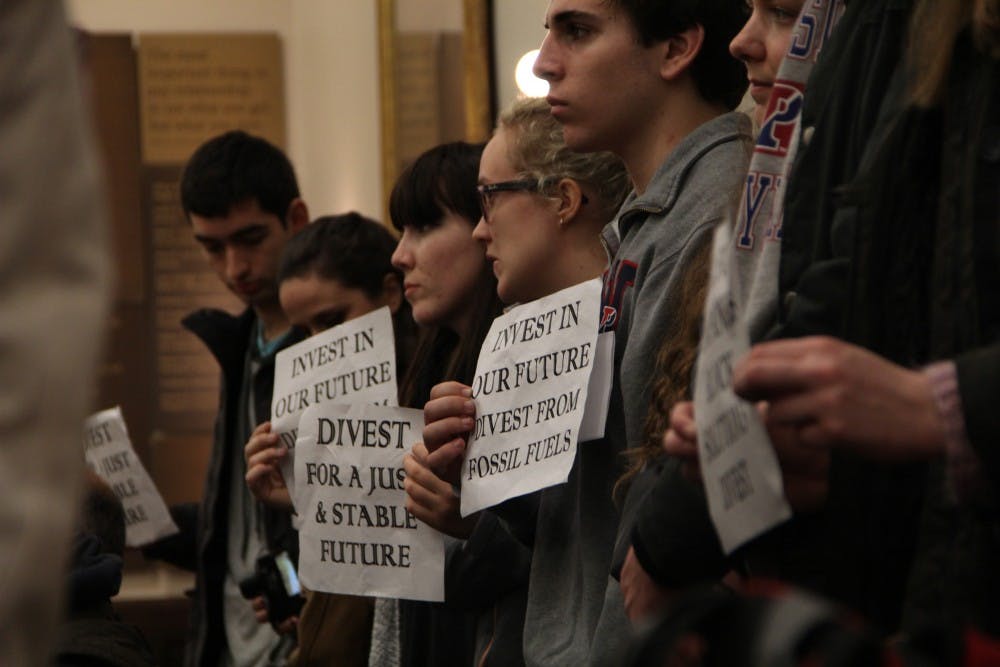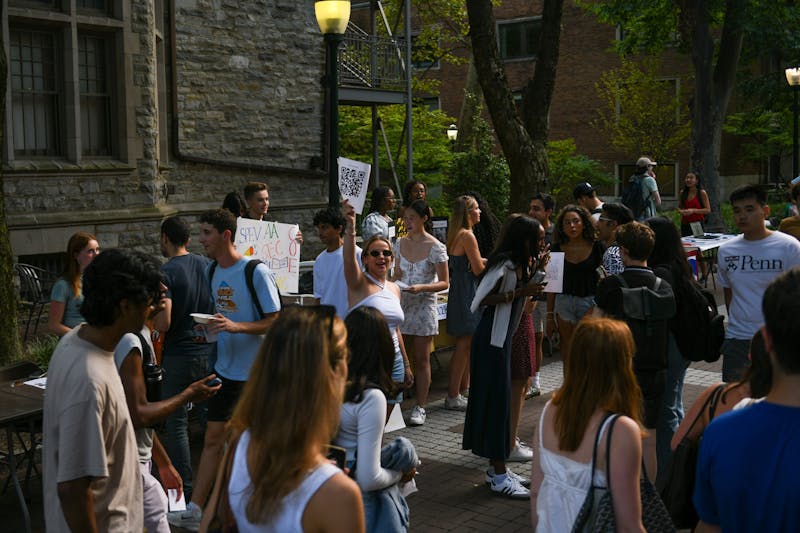
As the forum discussed divestment from fossil fuels, those involved with the rally stood up in silent solidarity baring their weathered signs.
Credit: Carson KahoeCarrying posters rendered limp by the drizzly weather, a small group of students and protesters walked through Perelman Quadrangle Wednesday with the chant, “Hey Amy G, make Penn fossil free!”
Following the passage of a student referendum last winter urging Penn to divest from fossil fuels, the University Council recently voted to move forward with the divestment proposal submitted by the student group Fossil Free Penn. Before heading over to Wednesday’s UC open forum, Fossil Free Penn members and supporters held a brief rally on College Green about the need for divestment.
The speakers framed the choice as one of not only environmental but also social justice; Michelle Lopez, a College senior, said Penn couldn’t claim to show support for social justice while “supporting oppression via fossil fuels,” while College freshman Zach Rissman also emphasized the school’s mission of social impact.

Once at the forum, the group sat together in the auditorium as various Penn students and alumni spoke on issues ranging from the University’s approach to sexual assault to religious diversity on campus. Fossil Free Penn members College junior Peter Thacher, Wharton and Engineering junior Thomas Lee and 1989 Wharton graduate Brian Goz presented their speeches in favor of the proposal, other members stood up from their seats in silence and held posters to the gathered audience.
“I think we made a good impression,” College senior and Fossil Free Penn member Jorge Mancilla said. “Standing up was a powerful demonstration and we definitely made ourselves heard, but it was also a very respectful demonstration.”
Thacher emphasized the toll of climate change on people in developing countries, while Lee and Goz focused on the financial side of the proposal, claiming the trustees had a fiduciary duty to their donors to invest in sustainable industries. Not all the speakers, however, were convinced that divestment is the right idea.
Engineering senior Dillon Weber spoke against the proposal, arguing that divestment is a merely symbolic gesture. “Real action that contributes to solving the problem is better than symbolic action,” he said, suggesting the University could do more to reduce emissions instead and praising the school’s new Climate Action Plan. “I am in no way denying anthropogenic climate change,” he said, “but divestment is not a good tool.” Weber pointed out that the University would still be heavily reliant on petroleum products like plastics and steel in all of its operations, claiming it would be a “hypocritical and empty gesture to claim to divest while still relying on petroleum.”
Professor Simon Richter of the German department had a different view. Speaking at the rally before the forum, Richter said, “It might be hypocritical for Penn to divest because we are dependent [on fossil fuels], but it’s also hypocritical for Penn to invest in the future of its students academically while at the same time investing in the destruction of their futures via fossil fuels.”
The divestment proposal will be examined by an ad hoc advisory committee next semester including faculty, students, alumni and staff; the committee will then provide the Board of Trustees with a recommendation on how to proceed.
The Daily Pennsylvanian is an independent, student-run newspaper. Please consider making a donation to support the coverage that shapes the University. Your generosity ensures a future of strong journalism at Penn.
DonatePlease note All comments are eligible for publication in The Daily Pennsylvanian.







